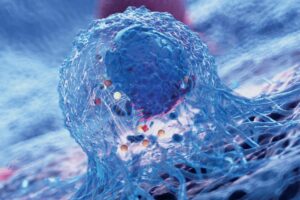What is already known
In early life, the gut undergoes rapid development, influenced by the microorganisms that colonize it. Previous studies have shown that breastfeeding supports healthy gut bacteria, while formula feeding can increase the risk of necrotizing enterocolitis (NEC) — a life-threatening condition in premature babies where the gut becomes inflamed. However, the exact effects of feeding practices on the infant gut microbiota and the link to NEC are still unclear.
What this research adds
Working in mice, researchers found that formula feeding leads to an overgrowth of Klebsiella bacteria that produce a toxin called tilivalline. This toxin activates various signaling pathways, resulting in alterations of genes that protect the gut from damage by immune cells. Breastfed mice exposed to toxin-producing strains of Klebsiella suffered from NEC-like gut damage, but strains that did not produce the toxin did not cause this problem. Formula-fed mice had more of a specific type of immune cell that is linked to increased inflammation and NEC-like damage.
Conclusions
The findings highlight the importance of the gut microbiota in gut development and immunity, and they provide insights into how microbiota-based interventions could prevent serious conditions such as NEC.
In the early days of life, the gut undergoes rapid development, influenced by the microorganisms that colonize it. Now, researchers have found that different feeding practices affect how susceptible infants are to disease.
The findings, published in Cell Host & Microbe, highlight the importance of the gut microbiota in gut development and immunity, and they provide insights into how microbiota-based interventions could prevent serious diseases such as necrotizing enterocolitis (NEC) — a life-threatening condition in premature babies where the gut becomes inflamed.
Previous studies have shown that breastfeeding supports healthy gut bacteria, while formula feeding can increase the risk of NEC. However, the exact effects of feeding practices on the infant gut microbiota and the link to NEC are still unclear.
To address this question, researchers led by Saravanan Subramanian at the University of Illinois at Chicago looked at how different gut bacteria from breastfeeding or formula feeding affect how the gut handles infections and how this might lead to NEC.
Harmful bacteria
First, the researchers exposed germ-free pups to a viral infection. The mice showed moderate gut damage, while animals with a normal microbiota were resistant. These findings suggest that gut microbiota colonization plays a key role in protecting the neonatal gut from virus-induced inflammation.
After exposure to a viral infection, formula-fed mice developed gut injuries resembling those caused by NEC, while breastfed mice showed only mild damage. Formula-fed pups also showed higher gut permeability, reduced weight gain and increased mortality compared to breastfed pups.
In formula-fed mice, the researchers observed an increase in harmful bacteria, particularly Klebsiella species that produce a toxin called tilivalline. Klebsiella bacteria have been linked to NEC in humans, and tilivalline was found at high levels in the guts of formula-fed mice.
Inflammation tolerance
Further experiments showed that tilivalline activates various signaling pathways, resulting in alterations of genes that protect the gut from damage by immune cells. Breastfed mice exposed to toxin-producing strains of Klebsiella suffered from NEC-like gut damage, but strains that did not produce the toxin did not cause this problem.
Compared to breastfed mice, formula-fed mice also had more of a specific type of immune cell that is linked to increased inflammation and NEC-like damage. Reducing these cells dampened the damage, suggesting that they play a key role in NEC.
The results shed light on how newborns adapt to different microorganisms and build inflammation tolerance, the researchers say. “Our findings provide an illustrative example for gaining insights into this process, thereby advancing our understanding of how alterations in commensal microorganism colonization impact human health and contribute to diseases, including inflammatory and autoimmune disorders, diabetes, allergies, and cancer.”











